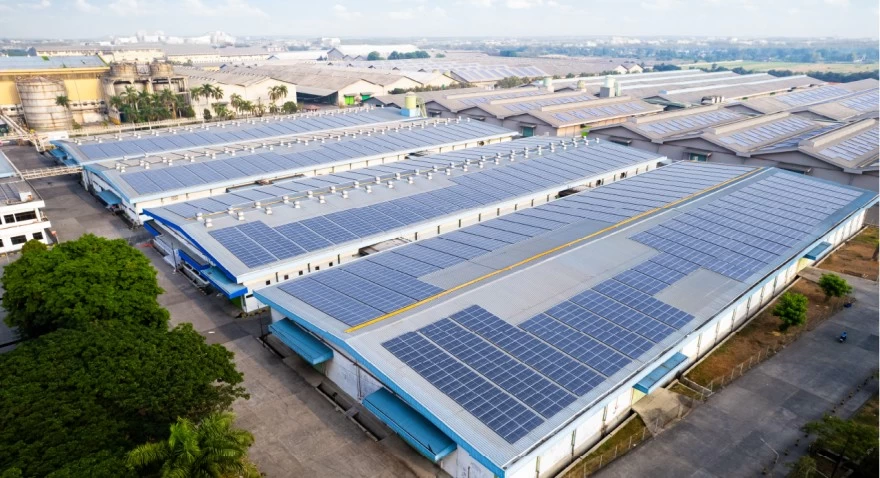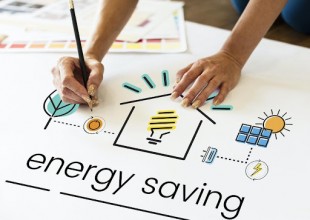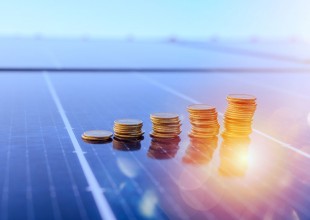Industrial Sector Becomes the Main Driver of Solar Energy Adoption in Indonesia

Demand for clean energy in Indonesia’s industrial sector continues to rise, driven by global decarbonization efforts and the national Net Zero Emission 2060 target. Today, the use of solar energy systems is no longer merely an option for cost efficiency but has become a strategic component of long-term sustainable business transformation.
As Indonesia’s leading solar energy developer, SUN Energy has recorded strong growth in demand from various industrial sectors seeking to transition to renewable energy. From heavy industries such as steel to fast-moving consumer goods, solar energy adoption has proven to be a strategic step to reduce emissions while maintaining competitiveness in the global market.
Below are several industrial sectors with the highest potential to adopt solar energy as an efficient and clean power source:
1. Steel and Metal Industry: Energy Efficiency for High-Consumption Sectors
The steel and metal sector is one of the world’s largest energy users. Smelting, casting, and coating processes require massive and stable electricity supply. In Indonesia, the steel industry accounts for an estimated 15% of total industrial energy consumption. With large rooftop areas, solar energy becomes an effective solution to reduce operating costs without compromising productivity.
2. Automotive Industry: Supporting Electrification & Green Manufacturing
The automotive sector requires high electricity use for assembly lines, painting facilities, and cooling systems that operate almost nonstop. This industry contributes 19% to the manufacturing sector and 4% to national GDP. As electrification accelerates, manufacturers are increasingly integrating solar energy systems in production facilities as part of their green manufacturing strategy.
3. Mining: Off-Grid Solar + BESS as an Alternative to Diesel Generators
Remote mine sites are often located far from the grid, relying heavily on diesel generators, where fuel costs can reach 20–40% of total operational expenses. Off-grid solar combined with Battery Energy Storage Systems (BESS) is now an efficient alternative to supply sustainable 24/7 electricity without additional emissions.
4. Pulp & Paper: Reducing Energy Load by Up to 70%
The paper industry is among the most energy-intensive sectors. The drying process contributes up to 70% of total energy use. With operations largely during daytime, solar energy significantly reduces peak load electricity and carbon emissions.
5. FMCG: Clean Energy for Sustainable Consumer Goods
Food, beverage, and fast-moving consumer goods companies require high electricity for cooling, packaging, and distribution. Many FMCG companies in Indonesia now adopt solar energy to enhance cost efficiency and strengthen their sustainable brand image.
6. Cement & Building Materials: Toward Low-Carbon Production
Cement production produces significant emissions, especially from clinker combustion. This sector contributes roughly 7% of global CO₂ emissions. Installing solar energy systems helps reduce fossil-based electricity use and supports the shift toward low-carbon operations.
7. Petrochemical & Plastics: Staying Competitive in the ESG Era
The petrochemical sector requires high and constant electricity usage. With rising sustainability demands from investors, solar energy adoption helps reduce operating costs, lower GHG emissions, and enhance competitiveness under global ESG standards.
8. Ceramics: Energy Efficiency for Green Export Markets
Ceramic manufacturing involves energy-intensive heating and firing processes, representing up to 30% of production costs. Solar energy supports lower electricity expenses while helping companies meet sustainability standards required by export markets like Europe and Australia.
9. Feed & Fertilizer Industry: High Potential for Large-Scale Solar Deployment
Fertilizer and animal feed factories typically have large open spaces ideal for solar installations. With consistently high electricity demand, solar energy helps maintain production efficiency and ensures stable, sustainable power supply.
Toward a Low-Carbon Industrial Ecosystem
The shift toward clean energy in the industrial sector cannot be achieved alone, it requires cross-sector collaboration to truly strengthen national competitiveness. Through partnerships across industries, SUN Energy continues to accelerate solar adoption, supporting Indonesia’s transition toward a resilient and sustainable low-carbon industrial ecosystem.
***
References:
- https://aseanenergy.org/wp-content/uploads/2025/07/Net-Zero-Roadmap-for-Indonesias-Steel-Industry_Report.pdf
- https://www.adlittle.com/sites/default/files/reports/ADL_Indonesias_emobility_potential_2023.pdf
- https://fmsonline.co.za/blog/mining-production-and-fuel-efficiency-a-quick-study-in-rapid-wins-for-mining-operations
- https://www.resourcewise.com/blog/forest-products-blog/pulp-paper-market-spotlight-indonesia-0
- https://gccassociation.org/cement-industry-net-zero-progress-report-2024-25
- https://skylight-strategic.com/indonesias-petrochemical-industry-competitive-landscape-benchmark-and-growth-pathways
- https://energypartnership.cn/fileadmin/china/newsroom_docs/Energy_Efficiency_in_the_Ceramics_Industry.pdf
- https://www.un-page.org/static/620281a2f9075059a344ab9da71dd52c/73da3-final-report-recp-study-at-fertilizer-sector-unido-page.pdf


